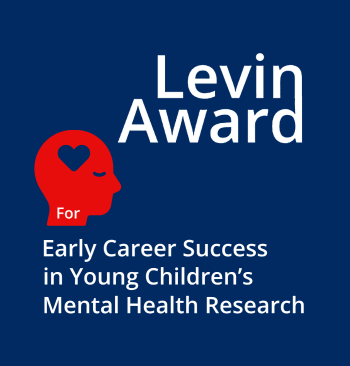Victoria S. Levin Award
The Victoria S. Levin Award for Early Career Success in Young Children's Mental Health Research aims to foster early career success in achieving funding for research that is informed by developmental science to address concerns affecting the early foundations of children's mental health.


History of the Award
In 30 years of distinguished service at the National Institutes of Health (NIH), Victoria S. Levin's career centered on fostering scientific research that could address the mental health needs of children. Upon her retirement there was an exceptional outpouring of tributes from the many distinguished scientists with whom Vicki worked over these years. The tributes vividly highlighted two hallmarks of Vicki's life work. First, they acknowledged Vicki's passion for scientific research examining development in the very first years of life, years that form a critical foundation for the development of lifelong mental health, and which play an important role in the prevention of mental disorders. Second, they praised her unique capability for encouraging new scientists, instilling them with confidence that they could achieve the high standards required to secure their first major funding from the NIH. The Victoria S. Levin Award for Early Career Success in Young Children's Mental Health Research is established to continue Vicki's legacy in these two areas.
Vicki's training in child mental health and her personal commitment to a fair and just world penetrated her work in myriad ways. In particular, Vicki had exceptional skill at recruiting the most outstanding scientists for her scientific review panels, and for fostering dialogue among the scientists during the review process. These achievements insured that investigators received the most rigorous, fair, and thoughtful review of their applications for federal funding. Vicki cultivated the relationships among her reviewers with the aim of creating a collegial scientific climate in which careful independent reviews coalesced as consistent, consensus-based feedback to investigators seeking funds for their research. This work contributed to the NIH's ability to support only research that meets the highest standards of scholarship. As a result, to the new scientist, the prospect of acquiring NIH research funds is daunting. While maintaining the integrity of the scientific review process and avoiding favoritism, Vicki used her intelligence and interpersonal skill to give the process a human and humane countenance. Furthermore, she encouraged new scholars that they could master the challenge of securing funding.
Purpose of the Award
In tribute to Vicki's role as a guiding light in the early careers of many distinguished scientists, the Victoria S. Levin Award has been established. Its aim is to foster early career success in achieving funding for research that is informed by developmental science to address concerns affecting the early foundations of children's mental health. The Award will add measurably to Vicki's dream of a society in which all children are protected from disabling mental health problems by getting the healthiest start in life. Vicki believed strongly in the NIH's critical role in creating a scientific basis for achieving this goal and in the need to attract the best and brightest new scientists. Therefore, the Victoria S. Levin Award is designed to increase the likelihood that promising early career scientists succeed in securing NIH funding.
The Victoria S. Levin Award review committee is chaired by Dr. Seth Pollak.
SRCD would like to honor the contributions of Dr. John Schulenberg, a member of the Levin Award Review Committee for the past several years. Dr. Schulenberg passed away on February 9, 2023. His leadership and commitment to supporting early- and mid-career scholars in developmental science will be lasting and remembered.
Benefits of the Award
The Victoria S. Levin Award is a non-renewable award of up to $25,000 for promising pre-tenured, early-mid-career investigators. The award:
- Supports release time from duties during which time the awardee writes and submits an application in the area of early childhood mental health to the NIH. This support compensates the awardee's unit/department for the work from which the awardee is released. Having adequate time to develop and submit a grant application is essential for early career success. [Applicants must provide institutional and department assurance signifying acceptance of this guideline. See "Required Application Elements" below.]
- Provides travel funds for a trip to NIH to meet program staff. This support helps the awardee develop meaningful contacts with NIH program staff who can guide the application preparation and revision (funding usually requires two application submissions).
- Provides a pre-review of the application. The opportunity to hire a distinguished scientist to review the application in advance of submission to NIH heightens the chances of early success. In addition to providing a critique, the reviewer can also advise the new scientist, which NIH review panels cannot do.
For questions, please contact scholar@srcd.org.
2025 Victoria S. Levin Eligibility and Submission Requirements
The deadline for the 2025 Victoria S. Levin Award for Early Career Success in Young Children's Mental Health Research is Friday, January 9, 2026 at 11:59 p.m. ET.
Applicant Eligibility
The applicant must:
- Be a current member in good standing of the Society for Research in Child Development
- Be employed at a nonprofit institution, either in the United States or abroad. In most instances, these organizations will have 501(c)(3) tax exempt status, set up to receive and process grants and awards. However, in rare cases, colleges or universities (such as Arizona State University) will not have 501(c)(3) tax exemption. If your institution fits into this category, we can instead accept an IRS determination letter which states that it is classified as a school under sections 509a1 and 170b1Aii of the IRS Code;
- Be committed to submitting a major NIH application (e.g., R or K mechanism);
- Show evidence of experience conducting research that addresses issues of compelling relevance for early childhood mental health theory, policies or practices. In keeping with Vicki's passionate interest in the sensitive and formative nature of early childhood for the development of mental health, and the need for scientific research that informs early intervention both preventive and therapeutic, applications should clearly articulate their relevance to the development of mental health in early childhood. All applications and especially those involving research with individuals beyond the elementary school years must explain the pertinence of the planned research to the first years of life. Longitudinal research is of high interest to the Foundation, as is experimental work with typically developing or at risk children. In all cases, the proposed research must have clear application to the promotion of mental health or the prevention of mental disorders in young children;
- Have received a doctoral degree (or equivalent) within ten years of submitting the application. In many scholarly disciplines this translates to a maximum of ten years following the Award of the doctoral degree and includes time spent as a post-doctoral fellow. In medicine, the ten-year maximum is dated from the completion of the first residency;
- Have a mentor who is an established investigator in NIH-funded early childhood mental health research. Applicants are advised to select as a mentor an individual other than their dissertation supervisor. The mentor will often not be at the same institution but may be. There must be clear evidence of the mentor's role and commitment to supporting the awardee's application
Required Application Elements
- Application Form – please fill out the application form through the online portal, where you will also submit the following materials.
- Institutional Assurance – including applicant's institutional signature (i.e., Grants & Contracts/Sponsored Research Office), thereby signifying the institution's acceptance of the guidelines and acknowledgement of application. A scanned document depicting a signature should be submitted electronically (See template);
- Department Assurance – a letter from the Department Chair/Head affirming the department's commitment to reduced teaching/clinical hours (See template);
- Mentor Letter - a letter from the mentor stating how the Award will enhance the applicant's qualifications and readiness for submitting an NIH application and describing the mentor's commitment to facilitating the mentee, the specific research application and the project;
- Mentor's NIH bio sketch or CV;
- Applicant Proposal - description, not to exceed 5 pages, by the applicant of
- Research accomplishments
- Research and career plans for next 5 years
- Summary of research to be conducted during the award period
- Timeline;
- Budget - a 1-page maximum budget justification specifying how funds will be spent. Requests must not exceed $25,000. No indirect costs are allowed. Costs should be directed towards teaching releases, mentoring related travel, and/or workshop/training attendance; funds are not typically approved for data collection or analyses. The budget statement should define the unique contribution of this Grant to the applicant's research activities and note the impact of this Grant on other institutional support available to the applicant. The applicant's current research funding must be listed, and should include any support pending;
- Applicant CV – a current version of the curriculum vitae, including educational history, professional activities, and publication and funding records;
- Letters of Recommendation – two letters of recommendation from senior scientists who are currently knowledgeable about the applicant's research activity. These letters must not be from the applicant’s Levin Award mentor. The application asks for the names and emails of both recommenders who will be notified to upload their letters after the applicant submits their proposal; and
- Copies of 2 representative publications (published or in press). Please upload the two publications which you are most proud and/or believe are most representative of the type of scholarship you create.
A note on applying: SRCD’s awards management platform has changed. Please use the link below to create a new account and complete the application. If you have questions, please reach out to scholar@srcd.org.
You must be a current SRCD member to apply. If you are not, your application will not be considered.
Past Awardee Announcements
- 2024 Levin Recipient Announcement
- 2023 Levin Recipient Announcement
- 2022 Levin Recipient Announcement
- 2021 Levin Recipient Announcement
- 2020 Levin Recipient Announcement
- 2019 Levin Recipient Announcement
- 2018 Levin Recipient Announcement
- 2017 Levin Recipient Announcement
- 2016 Levin Recipient Announcement
- 2015 Levin Recipient Announcement
- 2014 Levin Recipient Announcement
- 2013 Levin Recipient Announcement
- 2012 Levin Recipient Announcement
- 2011 Levin Recipient Announcement